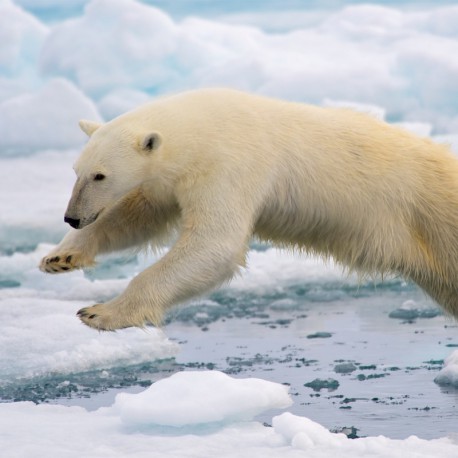 View larger
View larger
Polar Bears Go With the Floes
New activity
In this "high-stakes" board game, everyone wins or everyone loses!
Open Activity
How-to Video
Teacher's Guide
Provides classroom connections, key concepts, connections to science standards, and additional resources.
Modification and Prep List
-
Rating
-
Participants Enjoyed the ActivityParticipants Learned from This ActivityActivity Instructions Were Clear and Easy to FollowWould Recommend
Related Programming Resources
Reviews
Not so "high stakes" which watered down the lesson
First off, I love using games to learn, so I had really high hopes for this game.
The materials are great, the premise is great, and the “Eco Facts” make for some outstanding “wow” moments among the kids. In brief, the goal of the game is for all players to reach the end square before all the “ice” in the middle of the board melts, leaving a doomed polar bear. Player’s start with four “Green Point” cards worth 10,000 points each to pay the cost for any “Eco Bloopers” they land on while moving around the board. If players choose to forego or are unable to pay the “Eco Blooper” cost, they must remove one piece of the ice floe. Along the way, the players can land on “Eco Fact” spaces to learn cool climate, recycling, and environmental facts.
The problem, I think, comes from the game balance. It was nearly impossible to lose -- which all but eliminated the importance of the lesson. The “Eco Bloopers” penalties range in value between 10,000 and 30,000 points. Since each player only has a maximum of 40,000 “Green Points”, it is much easier to intentionally lose a single ice floe piece than pay for any penalties exceeding 10,000 points. This means most players will have plenty of “Green Point” cards to use late in the game, if needed. I had three groups of four playing the game continually for forty minutes (a game typically finishes in 10-15 minutes) and not a single group lost or came close to losing.
For the last game, I changed one rule: the player had to remove one ice floe piece for each 10,000 points on the “Eco Blooper” if they chose not to use their “Green Points”. Now, each player had to make a real effort to save the polar bear instead of using the ice floes as bargaining chips in their attempt to be the “big winner”. One of the three groups did not win.
Overall, the kids really enjoyed the game, and latched on to the amazing “Eco Facts”. The information is great, but when using the rules as written, the game seems too easy to “win”, so the intended lesson on the consequences of actions ends up falling flat.



